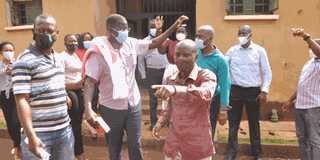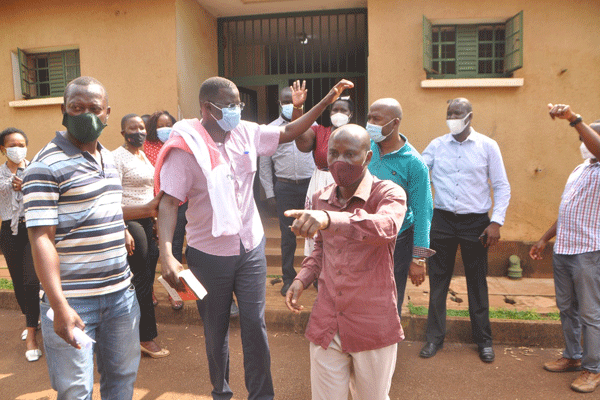Chapter Four holds breath as court rules on its fate

Mr Nicholas Opiyo, the head of Chapter Four, a civil rights group (2nd left), at Nakawa court in Kampala after his arrest last year. PHOTO/COURTESY
What you need to know:
- Chapter Four is accused of operating in “non-compliance” with the law.
The High Court in Kampala will on Friday pass its ruling on the continued closure of Chapter Four by government.
The ruling is expected to be delivered by the head of the Civil Division, Justice Musa Ssekaana, by e-mail.
The outcome will either have the indefinite suspension of operations of Chapter Four lifted or upheld.
In August last year, government suspended operations of 54 Civil Society Organisations (CSOs), including Chapter Four, as a move to tighten its grip on their activities.
The Friday ruling will also have a bearing on the remaining 53 CSOs that government indefinitely suspended.
Presiding judge will base his ruling on the written submissions by both parties (Chapter Four and NGO Bureau) in “favour” and “against” lifting of the indefinite suspension.
Case
Chapter Four sued the NGO Bureau last year after the later accused it of operating in “non-compliance” with the law, which lead to it’s eventual closure.
In its written submissions now before court, Chapter Four argues that NGO Bureau did not have powers to indefinitely suspend their operations.
It argues that there is a sharp distinction between the “power to indefinitely suspend” an NGO permit pending investigation that was exercised by the NGO Bureau in August 18, 2021 and the “power to suspend” that is provided for under the NGO Act, 2016.
“The respondent (NGO Bureau) has completely failed to state to this court the statutory provision/backing that empowers it to exercise the powers purportedly exercised in the letter dated August 18, 2021, especially the powers to indefinitely suspend NGO permit pending investigations, direct cessation of business operation pending investigations and halt all transactions of the applicant (Chapter Four) pending investigations,” Chapter Four submitted.
“In the instant facts, the applicant was not subjected to any disciplinary hearing prior to its being subjected to the indefinite suspension. In fact, the respondent did not summon the applicant (Chapter Four) to any disciplinary hearing and neither did the respondent (NGO Bureau) give the applicant the opportunity to be heard as dictated by Section 7 (1) b and 7 (2) of the NGO Act, 2016,” It argues in its written submissions.
NGO Bureau defence
But in rebuttal, the NGO Bureau in its written submissions contends that prior to evoking the indefinite suspension of Chapter Four they had written to them on December 28, 2020 to show cause why their permit should not be revoked for not filing their books of accounts.
“On the 6th January, 2021, the applicant’s director admitted that they had not filed their books of accounts and operations, reports of programme activities, balance sheets and source of funding and indicated that they had taken remedial measures,” the NGO Bureau states.
The NGO Bureau further submitted that the law does not prohibit it from carrying subsequent investigations after revocation of an organisation’s permit.
It adds that having lawfully revoked Chapter Four’s permit, it had the effect of halting its operations.
Some affected NGOs
Africa Institute for Energy Governance (AFIEGO)
Western Ankole Civil Society Forum (WACSOF)
Citizens’ Concerns Africa
Elohim Power Transforming Africa
Orone Foundation
Light Concepts
Public Policy Institute
Support Girl Child Uganda
Adoration Ministries
Islamic Da-awah and Orphanage Foundation
Jesus Shines Youth Ministries International
La Borne Missionary Centre UgandaFoundation.
READ MORE




